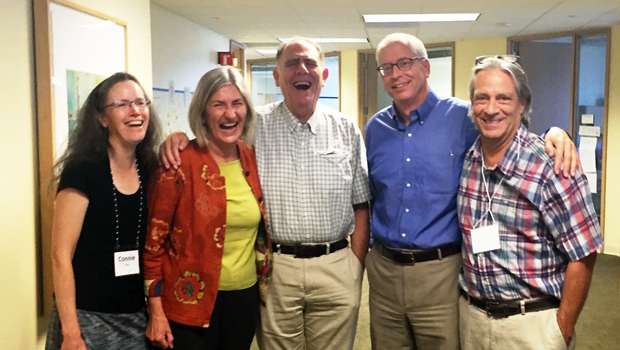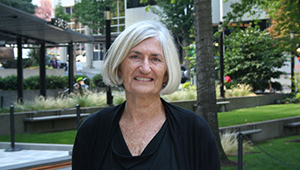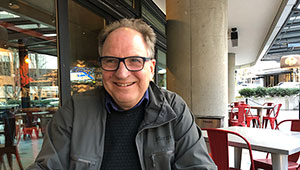6 habits for finding joy in work

Former MacColl Center colleagues shared laughs at a reunion a few years ago. (From left: Connie Davis, Judith Schaefer, Ed Wagner, Brian Austin, and Mike Hindmarsh.)
MacColl Center’s Judith Schaefer offers advice we can take to heart.
What brings fulfillment to everyday clinical practice? How can health care providers and others avoid job burn out? These are topics Judith Schaefer, MPH, considered often in her 20+ years as a research associate at Kaiser Permanente Washington Health Research Institute’s MacColl Center for Health Care Innovation.
Upon retiring last month, MacColl Communications Coordinator Dona Cutsogeorge asked Judith to reflect on her own ideas about the ways anyone can find joy in their work. Here’s what Judith said.
1. Focus on what matters to you.
What matters to you matters to you. Sometimes it’s right in front of your face and you don’t have to look for it. Focusing on what matters will give your work meaning. Your work will be deeper because it has meaning for you.
2. Celebrate the journey.
The joy of work is in partnering with people and savoring what you’re doing right now. This follows from doing what is meaningful for you. Being completely engaged in a project or tasks that use you to your fullest are the ones you’ll look back on and think, “Wow, that was great!” Wouldn’t it be nice to see these moments as they’re happening? They don’t last, but they exist – and they keep you going.
3. Make learning a priority.
Being known as an expert is a good rung on your career ladder, but being willing to say, “I don’t know” and learning from others is key for staying open to new ideas and new ways of thinking.
4. Risk vulnerability.
There are times when your voice may not be heard. Persist. Risk challenging others when you believe your perspective brings value. Ground your voice by sharing your own experience – if not yours, offer the experience of others. Make the most of public speaking offers, small or large, even if it’s a big stretch.
5. Connect with others.
There is no joy like meeting like-minded others and forming friendships through a shared mission. Sometimes those friendships are with others who think very differently. Cultivating relationships is vital.
6. Take care of yourself.
We are all patients at one time or other. Learn to listen to your body, mind, and spirit, and nourish all aspects of your own health. Health care can support you, but no one will look after your own well-being like you can.
live healthy: Top Topics
Profile

Honoring Judith Schaefer: Patient champion and champion patient
Looking back on a career that reshaped how health systems tune in to patient perspectives.
our scientist's legacy

Celebrating Dr. Michael Von Korff’s 36 years of research to improve care for depression and chronic pain
Discovering better ways to care for people who are depressed or have chronic pain, one of KPWHRI’s founding scientists has helped change health care around the globe.


